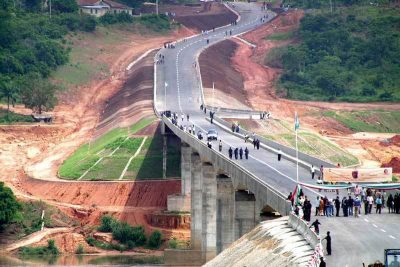The deplorable state of roads across the country and the attendant losses to the nation was one of the high points of discussion at this year’s conference of the Nigerian Society of Engineers even as the speakers made a case for the authorities at all levels of government to consider the use of concrete as alternative option.
With about $1.5 billion economic loss yearly due to bad roads, the engineers at the confab themed “National Integrated Infrastructure Master Plan (NIIMP): Strategies for Implementation” held in Akure bemoaned the infrastructural deficit that has been the lot of the country with a submission that infrastructural policy implementation should be taken serious by government and her agencies.
They argued that the major issue with the Nigeria’s road infrastructure is the absence of effective and sufficient regulatory framework for effective road construction.
The reaction to the unsavory condition of the road infrastructure in the country was ignited by the paper on “Improving Service Delivery in Transport Infrastructure: The Concrete Road Option” presented by the Regional Chief Executive Officer of Dangote Cement Plc, Arvin Pathak who disclosed that Nigeria records an estimated economic loss of economic of between $1 billion and $1.5 billion every year, due to poor condition of roads.
READ ALSO: Buhari Govt’s Borrowings Justified – Lai Mohammed
Pathak, an engineer, who presented his paper during a session on ”Transport System as a Backbone for the Actualization of NIIMP” gave an embarrassing vivid picture of the state of Nigerian bituminous roads constructed few years ago as opposed to concrete roads in the USA and India which have been constructed over 80 years ago and still smooth.
After giving a graphic picture of some failed bituminous roads, he said he; roads play very important part in nation’s infrastructure development. Well-designed concrete roads required little maintenance over 40 year design lives.
“Using concrete roads will result in less fuel consumption and less emissions. Small percentage % reduction of life time energy use associated with road will have significantly positive implications on sustainable development. Concrete roads are durable and safe. Less prone to wear and tear and low maintenance requirements is one of the principal advantages of concrete roads.”
Urging for a new policy that will accommodate the use concrete roads in the light of the defects of bituminous road and its attendant strain on the nation’s lean economy, the Dangote Cement boss, said the country free itself of frequent maintenance and overlay repeatedly increase cost and cause inconvenience to users.
According to him, the government would find out that Concrete road is the way to go because of easy availability of indigenously produced cement, uncertainty about bitumen availability in future.
He added: “Present cement capacity in Nigeria is around 41 million ton per annum while the expected demand of cement is 20 million in 2015. The capacity of cement plants under construction is 8.5 million ton per annum. Also there is adequate quantity of cement of international quality is now available within the country.
“This is against the fact that bitumen is derived from petroleum crude and the world supply of crude is not inexhaustible. It may last for another 25 years or so, but prices will continue to increase beyond expectation. it is in the country’s interest to conserve petroleum products and to adopt more eco-friendly and cost effective technologies.”
Another Speaker, Engr. Ali Kashim explained that the intervention by Federal Road Maintenance Agency (FERMA) could not achieve the desired result because the roads that it was to maintain were already failed and needed reconstruction and not maintenance.
READ ALSO: Southern Kaduna roads are in a pathetic situation – Motorists lament
“Maintenance means working on a good infrastructure to make it remain in good condition and not working on roads that had already failed and needed total reconstruction”, he stated.
Earlier in his address during the opening ceremony, President Muhammadu Buhari who was represented by the Secretary to the Government of the Federation, Babachir David Lawal lauded the roles being played by the engineers and that his government would work closely with them and other professionals to achieve the desired change promised by his government.
He said he looked forward to the communique from the Conference so that his administration could use it as one of the templates for the infrastructure renewal strategy being worked on.
Also speaking the Ondo State Governor, Olusegun Mimiko tasked the engineers to engage in more research development as well as develop efficient and cost effective infrastructure for Implementation in the light of the present decayed infrastructure in the country and the economic downturn.
He charged local engineers to brace up to the reality and the current challenges if they want to remain relevant to their calling as major stakeholders and principal actors in the management of the nation’s infrastructural development..
Mimiko, who commended the engineers for the theme “National Integrated Infrastructure Master Plan (NIIMP) 2014: Strategies For Implementation” said his administration has used Engineering as a tool to enhance the material conditions of his people.
The Governor said his administration has surpassed the previous administrations in terms of infrastructural development pointing out that “On a comparative analysis basis, there has not been any administration in Ondo State‘s almost 40-year old history that has been as active in the roads and infrastructure sector as our administration. When we came on board in 2009, we felt, and rightly too that the capacity of the Oyemekun–Oba Adesida road was overstretched, having been constructed since 1976 and without any major repair.

